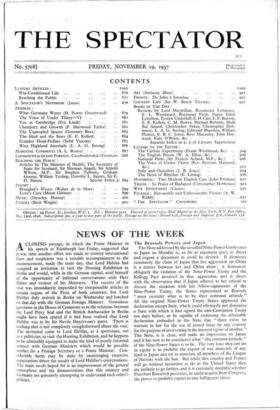The Brussels Powers and Japan The Note addressed by the
so-called Nine-Power Conference to Japan on Monday is, so far as argument goes, as direct and cogent a document as could be desired. It dismisses summarily the claim of Japan that her aggression on China is a matter between her and China alone ; it denounces obliquely the violation of the Nine-Power Treaty and the Kellogg Pact involved in that aggression, and it closes with the observation that if Japan adheres to her refusal to discuss the situation with her fellow-signatories of the Nine-Power Treaty, the States represented at Brussels " must consider what is to be their common attitude." All the original Nine-Power Treaty States approved the declaration except Italy, which could obviously not denounce a State with which it had signed the anti-Comintern Treaty ten days before, or be capable of endorsing the admirable declaration embodied in the Note that " there exists no warrant in law for the use of armed force by any country for the purpose of intervening in the internal regime of another." The, Note, it is clear, will make no impression on Japan and it has now to be considered what " the common attitude " of the Nine-Power States is to be. The very least they can do in equity is to prohibit the export of war materials of any kind to Japan and try to associate all members of the League of Nations with the ban. But while this country and France will go without hesitation as far as the United States they are unlikely to go farther, and it is extremely doubtful whether President Roosevelt possesses, or could acquire from Congress, the power to prohibit export to one belligerent alone.
















































































































